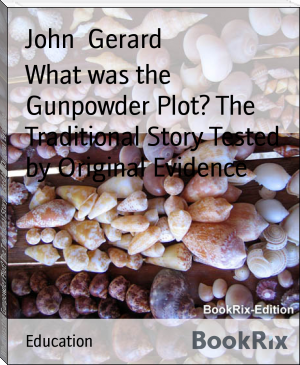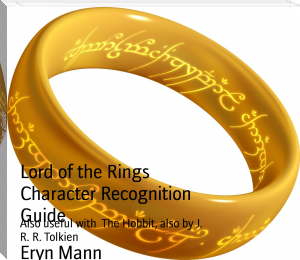What was the Gunpowder Plot? The Traditional Story Tested by Original Evidence - John Gerard (interesting novels in english txt) 📗

- Author: John Gerard
Book online «What was the Gunpowder Plot? The Traditional Story Tested by Original Evidence - John Gerard (interesting novels in english txt) 📗». Author John Gerard
A practical illustration of the methods freely employed by statesmen of the period will serve to throw fuller light upon this portion of our inquiry. In the service of the government was one Thomas Phelippes,[236] by trade a "decipherer," who was employed to "make English" of intercepted letters written in cipher. His services had been largely used in connection with Mary, Queen of Scots, some of whose letters he thus interpreted, having it in his power, as Mr. Tytler remarks, to garble or falsify them at pleasure.[237] Moreover, to serve the purposes of his masters, as he himself acknowledges,[238] he had upon occasion forged one side of a correspondence, in order to induce the person addressed to commit himself in reply.[239] At the time of the Gunpowder Plot, however, Phelippes had himself fallen under suspicion, on account of a correspondence with Hugh Owen, of whom we shall hear elsewhere. Accordingly, an attempt was made to hoist him with his own petard, and another agent, named Barnes, was employed by Cecil to write a letter, as coming from Phelippes (who was then in England) and carry it to Owen in Flanders in order to draw him out. At Dover, however, Barnes was arrested, being mistaken for another man for whom a watch was being kept. Thereupon, his papers being seized and sent to the Earl of Northampton, who appears not to have been in the secret of this matter, Cecil was obliged to arrest Phelippes at once, as though the letter were genuine, instead of waiting, as he had intended, in order to worm out more.
The story of this complex and crooked business is frankly told by Cecil himself in a letter to Edmondes, English ambassador at Brussels, which, after the above abstract, will be sufficiently intelligible.[240]
"As for Barnes, he is now returning again into Flanders, with many vows and promises to continue to do good service. As he was at Dover with my pass, carrying a letter from Philipps to Owen (of Barnes own handwriting, wherewith I was before acquainted), he was suddenly stayed by order from the Lord Warden, upon suspicion that he was one Acton, a traitor of the late conspiracy.... Whereupon, his papers and letters being sent to my Lord of Northampton, I thought fit not to defer any longer the calling of Philipps into question; which till then I had forborne, hoping by Barnes his means to have discovered some further matter than before I could do."
FOOTNOTES:
[200] He appears to have been no relation of John and Christopher Wright, the conspirators.
[201] Davies was employed in other affairs of a similar nature. See Dom. James I., xix. 83, I (P.R.O.).
[202] Cf. a "setter dog."
[203] See the full text of Wright's letter, Appendix G.
[204] See the text of the memorial, Appendix G.
[205] Copy in the P.R.O. Dom. James I. vii. 86, and xx. 52. The informer's name is given in the latter, viz., Ralph Ratcliffe.
[206] It was likewise cited in the interrogatories prepared for the Jesuit Thomas Strange (Brit. Mus. MSS. Add. 6178, 74) in November, 1605, and in this case also as treating of the Gunpowder Plot and no other.
[207] Illustrations, iii. 301.
[208] P.R.O. France, b. 132.
[209] Ibid.
[210] P.R.O. France, bundle 132.
[211] Ibid. f. 273 b.
[212] Hatfield MSS. 112, n. 141.
[213] P.R.O. Gunpowder Plot Book, 16.
[214] November 10th, 1605, Dom. James I. xvi. 44.
[215] At a later period (July 20th, 1606) we find that Southwaick ("or Southwell") had lost favour and was warned by Salisbury to leave the country. "I hold him," says the Earl, "to be a very impostor." (To Edmondes, Phillipps MS. f. 165.)
[216] Stowe MSS., 168, 39.
[217] Ibid. 40.
[218] Ibid. 42.
[219] Birch, Historical View, p. 234.
[220] P.R.O. France, bundle 132, January 25th, 1604-5.
[221] "Who so evar finds this box of letars let him carry hit to the Kings magesty: my mastar litel thinks I knows of this, but yn ridinge wth him that browt the letar to my mastar to a Katholyk gentlemans hows anward of his way ynto lin konsher [Lincolnshire], he told me al his purpos, and what he ment to do; and he beinge a prest absolved me and mad me swar nevar to revel hit to ane man. I confes myself a Katholyk, and do hate the protystans relygon with my hart, and yit I detest to consent ethar to murdar or treson. I have blotyd out sartyn nams in the letars becas I wold not have ethar my mastar or ane of his frends trobyl aboute this; for by his menes I was mad a goud Katholyk, and I wod to God the King war a good Katholyk: that is all the harm I wish him; and let him tak hed what petysons or suplycasons he take of ane man; and I hop this box will be found by som that will giv hit to the King, hit may do him good one day. I men not to com to my mastar any moe, but wil return unto my contry from whens I cam. As for my nam and contry I consel that; and God make the King a goud Katholyk; and let Ser Robart Sesil and my lord Cohef Gustyse lok to them selvse." (Printed in Appendix to Third Report of Historical MSS. Commission, p. 148.)
[222] It is signed "G.D.," and was possibly written by a relation of Sir Everard's.
[223] To Sir H. Bruncard, March 3rd, 1605-6. P.R.O. Ireland, vol. 218.
[224] "Instructions to my trusty servant Sir James Lindsay, for answer to the lettre and Commission brought by him from the Pope unto me." A^o 1604. (P.R.O. France, b. 132.)
In these notes the king explains that the things of greatest import cannot be written, but have been imparted "by tongue" to the envoy, to be delivered to his holiness. Moreover he thus charges Lindsay: "You shall assure him that I shall never be forgetful of the continual proof I have had of his courtesy and long inclination towards me, and especially by this his so courteous and unexpected message, which I shall be careful to requite thankfully by all civil courtesies that shall be in my power, the particulars whereof I remit likewise to your declaration." Besides this, he protests that he will ever inviolably observe two points: first, never to dissemble what he thinks, especially in matters of conscience; secondly, never to reject reason when he hears it urged on the other side.
[225] P.R.O. France, b. 132.
[226] Lodge, Illustrations, iii. 262.
[227] P.R.O. France, b. 132.
[228] Ibid.
[229] The Politician's Catechism, 1658.
[230] Birch, Historical View, p. 234.
[231] "If the Priestes and Catholickes, so many thousands in England would have entertayned it, no man can be so malicious and simple to thinke but there would have been a greater assembly than fourscore [in the Midlands] to take such an action in hand, and the Council could not be so winking eyed, but they would have found forth some one or other culpable, which they could never do, though some of them, most powerable in it, tendered and racked forth their hatred against us to the uttermost limites they could extend." English Protestants' plea, p. 60.
[232] Discourse of the manner of the discovery of the Gunpowder Plot. Printed in the Collected Works of King James, by Bishop Mountague, by Bishop Barlow, in Gunpowder Treason, and in Cobbett's State Trials, as an appendix to that of the conspirators.
[233] I.e., Cornwallis, Edmondes, and Chichester. The despatch to Cornwallis is printed in Winwood's Memorials, ii. 170.
[234] Sir Thoms Parry, P.R.O. France, bundle 132.
[235] Mr. Hepworth Dixon observes (Her Majesty's Tower, i. 352, seventh edition) that a man must have been in no common measure ignorant of Cecil and Northampton who could dream that such a design could escape the greatest masters of intrigue alive, and that abundant evidence makes it clear that the Council were informed of the Plot in almost every stage, and that their agents dogged the footsteps of those whom they suspected, taking note of all their proceedings. "It was no part of Cecil's policy," adds Mr. Dixon, "to step in before the dramatic time."
[236] Often called Phelipps, or Philipps.
[237] History of Scotland, iii. 376, note (ed. Eadie). It was on one of these letters which had been in the hands of Phelippes that Mary was convicted.
[238] Dom. James I. xx. 51. April, 1606.
[239] In the fragment cited above, Phelippes says that Queen Elizabeth and the Earl of Essex largely availed themselves of this device of his, and that "My Lord of Salisbury had himself made some use of it in the Queen's time."
[240] February 12th, 1605-6. (Stowe MSS. 168.)
CHAPTER VI. (THE "DISCOVERY.")
WHEN the conspirators first undertook their enterprise, Parliament was appointed to meet on February 7th, 1604-5, but, as has been seen, it was subsequently prorogued till October 3rd, and then again till Tuesday, November 5th. On occasion of the October prorogation, the confederates employed Thomas Winter to attend the ceremony in order to learn from the demeanour of the assembled Peers whether any suspicion of their design had suggested this unexpected adjournment. He returned to report that no symptom could be discerned of alarm or uneasiness, and that the presence of the volcano underfoot was evidently unsuspected. Thus reassured, his associates awaited with confidence the advent of the fatal Fifth.
In the interval occurred the event which forms the official link connecting the secret and the public history of the Plot, namely, the receipt of the letter of warning by Lord Monteagle. That the document is of supreme importance in our history cannot be denied, for the government account clearly stands or falls with the assertion that this was in reality the means whereby the impending catastrophe was averted. That it was so, the official story proclaimed from the first with a vehemence in itself suspicious, and the famous letter was exhibited to the world with a persistence and solicitude not easy to explain; being printed in the "King's Book," and in every other account of the affair; while transcribed copies were sent to the ambassadors at foreign courts and other public personages.[241] Had a warning really been given, in such a case, to save the life of a kinsman or friend, the circumstance, however fortunate, would scarcely have been wonderful, nor can we think that the document would thus have been multiplied for inspection. If, on the other hand, it had been carefully contrived for its purpose, it would not be unnatural for those who knew where the weak point lay, to wish the world to be convinced that there really had been a letter. It is, moreover, not easy to understand the importance attributed to Monteagle's service in connection with it. To have handed to the authorities such a message, evidently of an alarming nature, though he himself did not





Comments (0)